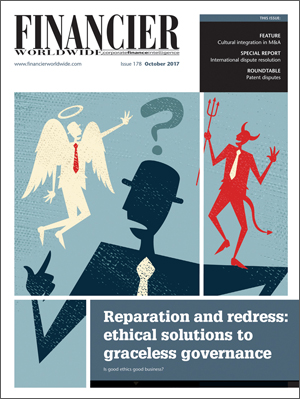US payments firm Vantiv agrees $10bn deal to buy Worldpay
October 2017 | DEALFRONT | MERGERS & ACQUISITIONS
Financier Worldwide Magazine
Worldpay, the UK’s largest payment processing company, has agreed to be bought out by US rival Vantiv in a deal worth $10.4bn.
Vantiv has offered 55 pence in cash, 0.0672 of a new Vantiv share, an interim dividend of 0.8 pence per Worldpay share and a special 4.2 pence dividend, for Worldpay. The price is a 23 percent premium on Worldpay’s closing price when rumours of the deal first emerged. Once the deal has been completed the combined company will be worth around $29bn.
Vantiv shareholders will own 57 percent of the new payments giant; Worldpay investors will hold the remaining 43 percent. The combined company’s global and corporate headquarters will be in Cincinnati, Ohio, and London will become its ‘international headquarters’. The company, which will operate under the Worldpay name, will be led by Charles Drucker as executive chairman and joint chief executive. Philip Jansen will serve as co-chief executive and Stephanie Ferris, chief finance officer.
Vantiv expects the deal to result in annual recurring pre-tax cost synergies of about $200m by the end of the third year following completion of the merger. It expects to incur one-off integration and restructuring costs of about $330m, the majority of which will be by the end of the second year. The cost cutting will entail job cuts, Vantiv has confirmed.
“Our combined company will have unparalleled scale, a comprehensive suite of solutions, and the worldwide reach to make us the payments industry global partner of choice,” said Mr Drucker in a statement announcing the deal.
“The growth of e-commerce and the way consumers expect to transact is increasing complexity for businesses around the world,” Mr Jansen said. The “combination of scale, innovation, technology and global presence will mean that we can offer more payment solutions to businesses, whether large or small, global or local”.
In light of the ongoing uncertainty surrounding Brexit, the merger has caused some concern in the UK. For some analysts, it is another example of an overseas buyer picking off a valuable UK asset on the cheap following the fall in value of sterling since summer 2016. Worldpay contacted MPs in the UK to explain the thinking behind the deal. Ron Kalifa, vice-chair of Worldpay, said “We have had several conversations with senior members of parliament to make sure they understand the strategic rationale. We were not ready [to do the deal] last year when the pound was in a different position. Letting this opportunity pass by [now] would have been the worst decision for shareholders, customers and staff.”
According to Worldpay, outside of the US there is very little overlap with Vantiv. The company also confirmed that the deal is about creating growth, not cutting costs. Mr Kalifa noted that if job cuts do occur in Britain they would be “negligible”. Worldpay has around 5000 staff in London, Manchester, Cambridge and Gateshead.
The deal is the latest in a number of mergers in the evolving payments processing industry.
The two firms initially announced their intention to merge in July, but given the scale and complexity of the deal it has taken a number of weeks for management of both companies to reach an agreement on certain conditions, including a London listing for the newly merged company.
Worldpay and Vantiv together process about $1.5 trillion in payments annually in a growing and evolving industry. Consumer trends are changing, and as more people turn away from cash transactions and utilise smart devices and mobile payments in the future, the industry is likely to look very different in the coming years. According to McKinsey, the global e-commerce market will double in size to about $4 trillion between 2015 and 2020.
© Financier Worldwide
BY
Richard Summerfield

